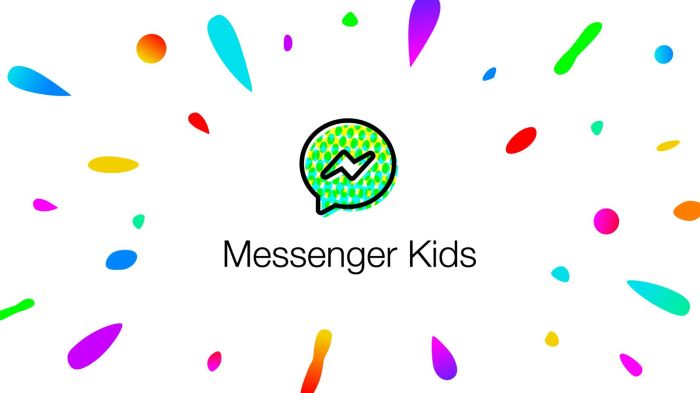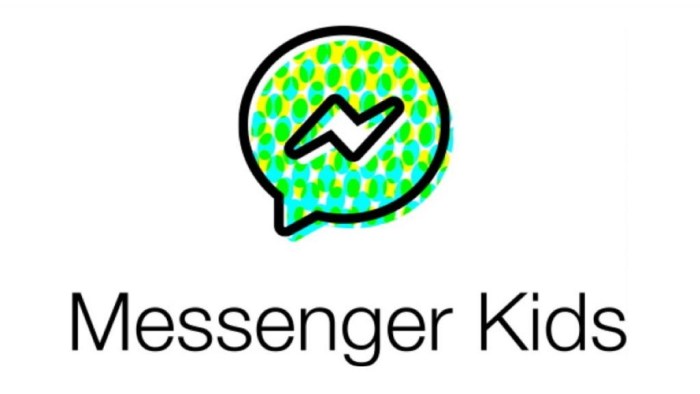Facebook Messenger Kids
Facebook Messenger Kids is a messaging app designed specifically for children, allowing them to connect with family and friends in a safe and controlled environment. The app is targeted at children aged 6 to 12, offering a platform for communication and entertainment that is tailored to their needs and developmental stages.
Key Features and Functionalities
Facebook Messenger Kids provides a range of features designed to enhance communication and entertainment for children.
- Video and Voice Calls: Children can engage in real-time conversations with friends and family members through video and voice calls, fostering a sense of connection and interaction.
- Group Chats: The app allows children to create and participate in group chats with their friends, enabling them to share messages, photos, and videos.
- Customizable Profiles: Children can personalize their profiles with fun avatars, emojis, and stickers, adding a touch of individuality to their online presence.
- Parental Controls: Parents have complete control over their child’s Messenger Kids experience, including the ability to manage contacts, set screen time limits, and monitor activity.
- Safety Features: Facebook Messenger Kids prioritizes safety by implementing robust security measures, such as blocking inappropriate content and preventing strangers from contacting children.
Rationale Behind the Launch
Facebook’s decision to launch a dedicated messaging app for children stems from the growing need for a safe and age-appropriate platform for online communication. The app addresses concerns about the potential risks associated with children using traditional social media platforms, such as cyberbullying, inappropriate content, and privacy violations.
Privacy and Safety Measures
Facebook Messenger Kids is designed with a strong focus on privacy and safety, aiming to provide a secure environment for children to connect with friends and family. It implements a range of features and controls to protect children’s information and online interactions.
Parental Controls and Monitoring
Parents play a crucial role in ensuring their children’s safety online. Facebook Messenger Kids empowers parents with robust controls and monitoring capabilities to manage their child’s experience.
- Account Creation and Management: Parents create and manage their child’s account, setting up a profile and controlling access to features. This ensures that children cannot create accounts independently without parental oversight.
- Contact List Approval: Parents approve the contacts their child can communicate with, limiting interactions to trusted friends and family members. This prevents children from connecting with strangers or individuals they shouldn’t be interacting with.
- Activity Monitoring: Parents can view their child’s conversation history, allowing them to monitor interactions and ensure appropriate communication. This provides transparency and allows parents to intervene if necessary.
- Time Limits: Parents can set daily time limits for their child’s usage, encouraging balanced screen time and promoting other activities. This helps prevent excessive use and promotes healthy digital habits.
- Content Filtering: Facebook Messenger Kids filters inappropriate content, blocking offensive language, images, and videos. This helps protect children from exposure to harmful or unsuitable material.
Privacy Features
Facebook Messenger Kids prioritizes the protection of children’s personal information. It implements several privacy features to ensure that data is handled responsibly.
- No Advertising: The app is free from advertising, eliminating exposure to potentially harmful or misleading content. This promotes a focused and safe environment for children.
- Limited Data Collection: Facebook Messenger Kids collects minimal personal information, focusing on the essential details required for account functionality and communication. This minimizes the amount of data collected and stored.
- Data Deletion: Parents can request the deletion of their child’s account and associated data at any time. This ensures that information is not retained unnecessarily.
- Privacy Settings: Parents can adjust privacy settings, controlling who can see their child’s profile information and activity. This empowers parents to manage their child’s online visibility.
Comparison with Other Messaging Apps, Facebook messenger kids launched
Facebook Messenger Kids stands out from other messaging apps for children in terms of its focus on parental controls and privacy. While other apps may offer some safety features, Facebook Messenger Kids provides a comprehensive suite of tools specifically designed for the unique needs of young users.
- Parental Control: Facebook Messenger Kids offers more robust parental control features compared to many other apps, allowing parents to manage contacts, set time limits, and monitor activity.
- Privacy Features: The app prioritizes privacy, with limited data collection, no advertising, and data deletion options. This contrasts with some other apps that may collect more data or display advertisements.
- Content Filtering: Facebook Messenger Kids employs advanced content filtering to block inappropriate content, while other apps may have less stringent filters or rely solely on user reporting.
User Experience and Design: Facebook Messenger Kids Launched
Facebook Messenger Kids is designed to be a safe and fun way for children to connect with their friends and family. The app features a user-friendly interface with bright colors, playful animations, and a simple layout that is easy for kids to navigate.
Interface and Design Elements
The app’s interface is designed to be intuitive and easy for children to use. The main screen displays a list of the child’s contacts, with large, colorful icons for each person. The app also features a variety of fun stickers and emoji that kids can use to express themselves.
Catering to the Needs of Young Users
Facebook Messenger Kids is designed to be age-appropriate and caters to the needs of its target audience. The app has features that are specifically designed to help kids stay safe, such as parental controls and the ability to block unwanted contacts. The app also features a limited set of features, such as the ability to send text messages, make video calls, and share photos and videos.
Comparison with Other Child-Friendly Apps
Facebook Messenger Kids is similar to other child-friendly apps, such as Marco Polo and Messenger Kids. These apps all feature a simple interface, parental controls, and a limited set of features that are designed to be age-appropriate. However, Facebook Messenger Kids stands out from other apps by offering a wider range of features, such as the ability to create group chats and play games.
Impact and Reception
The launch of Facebook Messenger Kids was met with a mixed bag of reactions, highlighting the complex considerations surrounding children’s online presence. While some lauded the app’s potential for facilitating communication and entertainment, others raised serious concerns about its impact on children’s privacy and well-being.
Initial Reception and Public Response
The initial response to Facebook Messenger Kids was characterized by a mix of enthusiasm and skepticism. Parents who saw the app as a safe and controlled way for their children to connect with friends and family embraced it. They appreciated features like parental controls, which allowed them to manage their child’s contacts and monitor their activity.
Controversies and Concerns
Despite its positive reception among some, Facebook Messenger Kids faced significant criticism and controversy. Some critics argued that the app was a tool for Facebook to further its own agenda, seeking to cultivate a younger generation of users. Others expressed concerns about the potential for cyberbullying, inappropriate content, and the addictive nature of social media platforms.
Potential Impact on Children’s Online Communication Habits
Facebook Messenger Kids has the potential to significantly impact children’s online communication habits. While it offers a platform for connecting with friends and family, there are concerns that it could lead to increased screen time, decreased face-to-face interaction, and the development of unhealthy social media habits.
Future Implications
Facebook Messenger Kids, despite its initial controversy, has established itself as a platform for young children to connect with their families and friends. The app’s future holds exciting possibilities, driven by technological advancements and evolving user needs.
Future Development and Evolution
Facebook Messenger Kids is poised for continuous development and evolution. The app’s future trajectory is likely to be shaped by emerging technologies and the changing landscape of online communication for children.
- Enhanced Privacy and Security Features: As concerns regarding children’s online safety persist, Facebook is expected to prioritize the development of even more robust privacy and security features. This could involve advanced parental controls, stricter content moderation, and potentially even incorporating AI-powered tools to detect and prevent harmful content.
- Integration with Other Facebook Products: Facebook Messenger Kids might be integrated with other Facebook products, such as Instagram Kids or Facebook Portal, to create a more comprehensive and interconnected ecosystem for children’s digital experiences. This integration could offer seamless communication and content sharing across platforms, but it would also raise new concerns about data privacy and user control.
- Augmented and Virtual Reality Features: AR and VR technologies are rapidly evolving, and their potential for children’s entertainment and education is significant. Facebook Messenger Kids could incorporate these technologies to create interactive and immersive experiences for children, allowing them to engage with friends in new and exciting ways. However, the ethical implications of exposing young children to these technologies need to be carefully considered.
Facebook messenger kids launched – The launch of Facebook Messenger Kids has sparked a debate about the role of technology in childhood. While the app offers potential benefits for connecting with loved ones, it also raises concerns about digital privacy and the impact of social media on young minds. Ultimately, the decision of whether or not to allow your child to use Facebook Messenger Kids is a personal one. But it’s crucial to be informed about the potential risks and benefits before making a decision.
Facebook Messenger Kids is a new app designed for kids to safely connect with friends and family, but it’s not the only thing making headlines this week. Samsung has officially responded to the Galaxy S6 Edge bending video, claiming it’s a rare occurrence and not a widespread issue. Meanwhile, Facebook Messenger Kids is still rolling out, aiming to give parents a little more peace of mind when their kids are online.
 Standi Techno News
Standi Techno News

